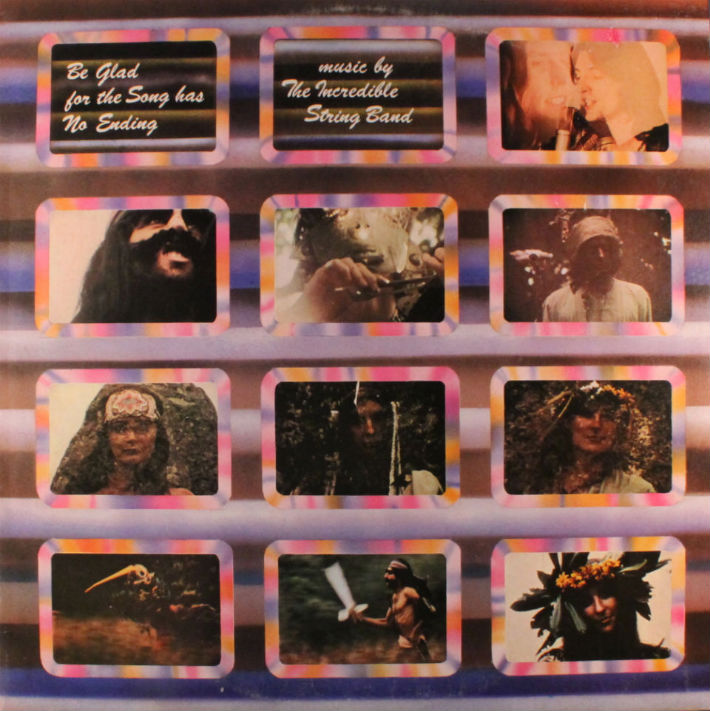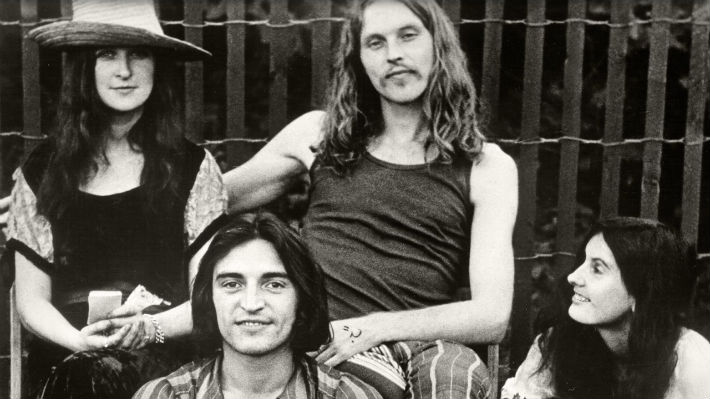Be Glad For The Song Has No Ending was a 1970 LP and film by Scottish psychedelic folk innovators, The Incredible String Band. Bizarre at times but still totally brilliant. There’s probably a certain time and place for this one.

Here’s a short biography of the band taken from the excellent Making Time Incredible String Band fansite as well:
One of the more unusual groups to come out of Britain in the 1960s, the Incredible String Band were highly influential in their day with the likes of Robert Plant and the Rolling Stones citing them as references. The String Band is one of those groups that are very difficult to categorise, sometimes described as psychedelic folk music, they were certainly an early exponent of World Music in the UK.
The group came together in the mid-1960s. Clive and Robin had been playing together at Clive’s Incredible Folk Club, a small folk club in Sauchiehall Street in Glasgow. They built up quite a following including Billy Connolly and Mike Heron, who later joined on guitar. They were a trio when Joe Boyd visited the club having heard about the band. He signed them to Elektra and they completed their first album, The Incredible String Band released in 1966. This showcased the fine writing talents of the three members and already showed, to a small extent, that they were moving beyond the usual folk style. Robin’s October Song from this album has become a classic and is highly rated by Bob Dylan.

Keen to capitalise on their success the band split up! Robin went to Morocco while Clive disappeared to Afganistan for some time. However, Mike and Robin teamed up again and from then on they formed the core of the Incredible String Band. The second album was a major turning point and ranks as a classic today. 5000 Spirits or the Layers of the Onion was released in 1967 and captured the spirit of the year, albeit in a very different way to much of what was around at the time. The sleeve was eye-catching, designed by The Fool who had painted the murals for the Apple boutique. the album established the String Band amongst the underground and brought world music to a “more mainstream” audience, if that is not a contradiction. During his travels Robin had picked up numerous instruments including a stringed instrument called a gimbri. Mike had learned sitar amongst other things. 5000 Spirits is almost exotic with its blend of unusual instruments alongside some highly creative lyrics and Mike and Robin’s distinctive vocal styles.
The biggest-selling album, reaching number five in the UK, was The Hangman’s Beautiful Daughter. This moved on from the previous album and contained a varied mix of folky songs. Mike Heron’s A Very Cellular Song was much longer than anything else and wove together different sounds while telling a tale of amoebae.
Next up was a double album Wee Tam & The Big Huge (note that this was reissued on CD with the UK edition two single albums). By this stage Mike and Robin had been joined by their girlfriends Rose Simpson and Licorice (Likky) McKechnie. It is widely argued that this was the peak of the String Band’s creativity and they sparked intermittently after this. Mike and Robin became involved in scientology and this may have had the effect of removing the critical element necessary to create the outstanding music that they were known for. Quite simply, they found it more difficult to criticise each other’s work. Nevertheless, their output was still prolific.
Be Glad For The Song Has No Ending was released as an album but there was also a film that is now available on video and DVD. In 1969, the String Band played Woodstock although it is said to be one of their poorest performances. They did not appear in the original film of the event but a short section of When You Find Out Who You survives on the DVD Woodstock Diaries.
Towards the end of the decade they produced U. This was more than an LP; it was a multimedia experience encompassing dance and mime and premiered at London’s Roundhouse. The band produced a few more albums in the early 1970s although none matched the quality of the earlier work. By 1974, both Rose and Likky had left and number of other musicians had been drafted in. Malcolm LeMaistre had from the dance troupe Stone Monkey and contributed some songs including the final single At The Lighthouse Dance. The band moved towards more of a rock sound and this may have served to isolate Williamson who was more of a folk purist. the final shows were played in 1974.
Robin Williamson has remained a prolific writer and recording artist, first with the Merry Band and then solo. Mike formed Heron and has made occasional albums but has been generally quieter. Clive Palmer formed Clive’s Original Band (COB) and the Famous Jug Band. In 1997, Robin and Mike got together for two concerts to dispel the myth that they were not on speaking terms. This was followed by a full reunion of the original three members in 1999 (with Robin’s wife Bina and Lawson Dando). This line-up has now been playing together regularly around the UK since then.
The Making Time fansite is well worth a deeper dig and 1997 ISB doc, Retying The Knot is also worth a watch. You can watch more things on Racket Racket here.
